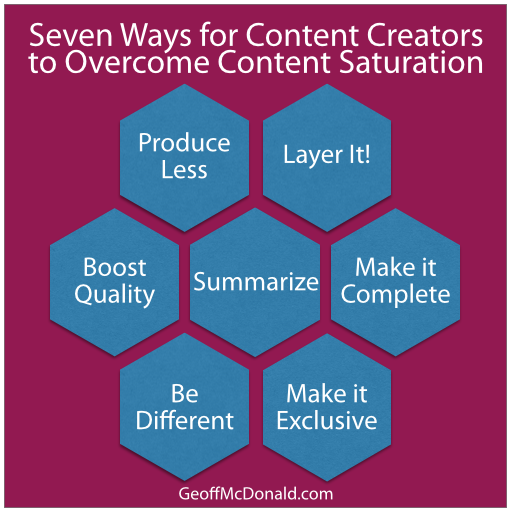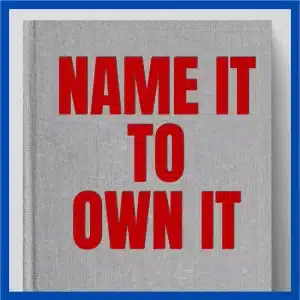
Previously we talked about the problem of content saturation and managing the amount of information you consume. And, then we shared seven suggestions for how to overcome content saturation when you’re the audience…
Today, we want to view Content Saturation when you’re the one creating the content.
In the age of Content Saturation, the challenge for the Content Creator is to be heard amongst the noise. This can be a big challenge given that almost everyone is screaming for your attention. And, I know from personal experience how much time and effort goes into creating quality content so you want to be heard.
Yet, if we’re the ones creating the problem, this creates a dilemma… Here are seven strategies to help you overcome Content Saturation for your audience.

1 Produce Less
The obvious solution to Content Saturation is to produce less. If we all did this then the problem would be solved instantly. Yep… sure… Some ideas are great in theory and completely lousy in practice. This is one of them. We are not going to solve this problem at the worldwide scale simply by producing less.
However, at a personal level, your specific audience may appreciate hearing from you less often. I’ve had that feedback with my daily blogging. Some people suggested they only want to read it once a week, others every couple of days. Another suggestion was to provide an overview where I list my weeks worth of content in one weekly summarized digest.
Whilst what your audience wants is important, I hope you can also hear that there will always be lots of different opinions and preferences. You can’t satisfy everyone and it’s not worth attempting to achieve this.
In my view, Content Creation is the opportunity of a lifetime. This IS what this era is all about. It’s about creating, sharing and connecting. If you track your results and listen to what your audience wants you can then decide to balance what you want to achieve and what works for them. We talked about this balancing act in this three part blog series on Content Channels:
TIP: Listen to your audience to decide what works and balance this with the outcomes you want to achieve. One option might be to produce less content.
[Tweet “Is less content better? 7 Strategies for overcoming #contentsaturation”]
2 Layer It!
One of the consistent ideas that I’ve shared about content creation over the years is to present your message in multiple formats and timeframes. For instance, write a series of blog posts, tweet about each post, collect them all together into an ebook, and then record them as audio for your podcast. One idea can be re-used in multiple ways.
Whilst this contributes to the overall flood of content, it also serves your audience better provided you make it easy for them to choose the way they want to absorb your ideas. Some people love blogs, some devour ebooks and others swoon over podcasts. Simply let them know: This is the recording from a recent blog post. This gives real channel choice – your audience can choose their ideal format without having to deal with repeats.
TIP: Give your audience choice about how they want to consume your content and make it clear what is new or repurposed from somewhere else.
[Tweet “Layer your content in multiple formats and timeframes for greater choice #content”]
3 Summarize
Another way of providing layers for your audience is to produce summaries of summaries. In this set of layers, your audience can then choose the level at which they want to engage. When I first started Book Rapper, my aim was to summarize an important business book so you could read it in 30 minutes. Some people loved the 30-minute RAP, others preferred to invest the 5-6 hours to read the full book and a third group said 30 minutes was too long. They wanted a five-minute version.
Whilst Book Rapper is a summary of an entire book, within each RAP is a one-page 200-word summary of the summary. I even created Twit Rapper, which summarized the summary in 26 tweets.
TIP: Provide a summary of a summary. This tip is an example of a summary. If you only read these tips then you would have a general grasp of this entire article.
[Tweet “7 strategies for #contentcreators to overcome #contentsaturation”]
4 Bump up the quality
I’ve been following the paleo/primal eating plan for the past 12 months. The key to this way of living is quality. Instead of eating processed foods that are usually high in volume and low in nutritional value, the aim is to eat only natural foods that are nutritionally dense. This means I eat less volume and less total calories whilst gaining more nutrients in the process.
This could be a good strategy for your content – bump up the quality so your audience consumes less volume. Whilst I have made a personal commitment to blog everyday, I am aware that sometimes this means not every post is going to be of high quality. An alternative may be to only blog when you’ve invested your heart and soul into producing something that is outrageously good – like every second or third day.
This also applies to the format of your content. For instance, instead of blasting out a 1000 word blog post, you might consider investing in an infographic that shows the same ideas in a way that can be ‘read’ in seconds. This will likely take you longer to produce and it will increase the chances of engaging your audience.
TIP: Review the content you have published in the past month. Which pieces are outrageously good and which are mediocre? How can you improve the quality?
[Tweet “7 #ContentStrategies: Less, Layer, Summarize, Quality, Complete, Different, Exclusive”]
5 Make it Complete
One of the interesting things that I have learnt from producing Book Rapper is that the complete ebooks are more highly valued than if I share the same content as a blog post. My interpretation of this is that content is perceived as being more valuable when it’s complete. This makes sense at a basic level. Half a map is a road to nowhere. Half a sentence is…
One example of this is this series of blog posts. Instead of sharing them as a series, it might be more valuable if they were presented as a single package in the form of an ebook. The perceived value goes up.
This strategy may complement the previous point about quality – produce one excellent ebook each month instead of 30 average blog posts. Alternatively, produce 5 excellent blog posts that are also bundled together as one excellent ebook. The best of both worlds!
TIP: People want solutions rather than tidbits. Provide a whole solution to present higher value content.
[Tweet “Complete content is more valuable than tidbits #contentsaturation”]
6 Be different
The big challenge for the content producer in the age of content saturation is to stand out and be heard above the noise.
One of the keys to Seth Godin’s success was that he chose to give away for free one of his first books: Permission Marketing. At the time this was a radical idea. His original publisher refused to publish the book if he gave it away for free so he had to find another publisher. In those days, nobody gave away their book! Seth’s view was that by giving away his entire book he would build an audience, which was more valuable long term than any revenue he received in the short term. He later proved this to be a smart strategy by selling a large volume of books to the audience who already had their free copy!
Seth still gives away free content including ebooks here.
The key to what Seth did was to be different. He went against the herd and the conventional wisdom. And, I don’t just mean wearing odd socks to be different for different sake. Seth was smart enough to know what was coming and be ahead of the curve. This is the ideal way to be different – get there first.
The opposite may also work – a return to the past. If you truly have a niche market of 100-150 people then consider sending out physical content to them. When was the last time you received an actual letter or postcard in the mail? Be aware that there will be costs involved – cost to print, to package, to post… It’s a lot more time and effort and it could work for the specialist.
TIP: To stand out amongst the tsunami of content, take a different approach. What is everyone else doing? What are they not doing? Spot your opportunity.
[Tweet “Zig whilst others zag – be different to be heard #contentsaturation”]
7 Make it Exclusive
The fundamental problem of content saturation is there is too much of it. One strategy for overcoming content saturation that adopts several of the principles already discussed is to make your content more exclusive. Let scarcity fuel demand.
This could be as simple as compiling your individual blog posts into a series of ebooks and putting them into a closed membership area. In this way you increase the perceived value of your content by provide complete sets of information that are limited in availability.
You could make this ‘membership area’ a fee-paying service like Book Rapper or simply a free ‘upsell’ to your regular readers that requires them to log-in.
TIP: Consider the whole spectrum of content that you create. Make some of it freely available and some of it more exclusive.
[Tweet “Increase the demand for your content by making it more exclusive #content”]
COMMENT: What tips would you add to this list to improve your chances of having your content noticed in the age of content saturation?
Next – the 4th and final Article in this series: The Content Saturation Solution.



